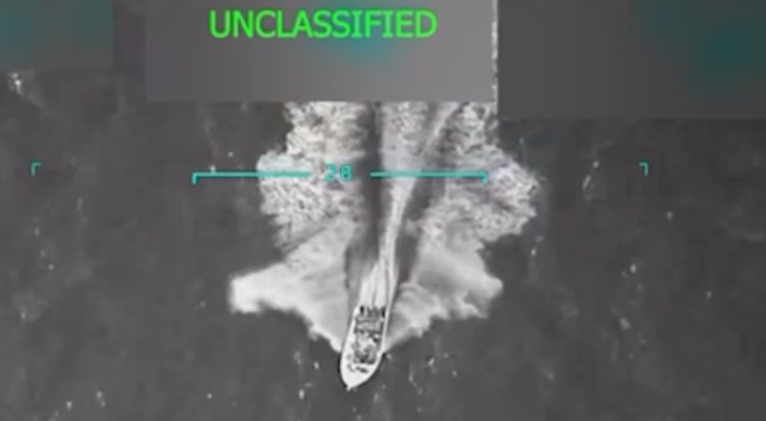The Intercept: U.S. Strike on “Narco-Boat” Was an Attack on Civilians
especiales

Washington, D.C. – A senior U.S. Department of Defense official has described the recent strike against a small vessel allegedly carrying drugs “in international waters” south of the Caribbean Sea, which reportedly resulted in the deaths of 11 people, as an attack on unarmed civilians, according to a report by The Intercept.
“The U.S. is now directly attacking civilians. Drug traffickers may be criminals, but they are not combatants,” the official told the outlet on condition of anonymity.
The source argued that former President Donald Trump’s administration had paved the way for such attacks, which, in their view, violate international law. “When Trump fired the top military lawyers, the rest realized what was coming, and instead of being a crucial firewall, they are now complicit in this crime,” the source said.
Operating Outside the Law
Last Tuesday, Trump announced the sinking of a boat that “was carrying a lot of drugs” allegedly coming from Venezuela. On Truth Social, he claimed the target was “narco-terrorists” from the Tren de Aragua criminal group. While he shared a video, he did not specify the location of the strike, how the vessel was identified as carrying narcotics, its port of origin, or the procedure used to attribute it to the organization.
Trump said 11 people were killed in the operation. The footage, which Venezuelan authorities have questioned, shows a small fishing boat that appeared to carry only five people, making it virtually impossible to transport large quantities of drugs.
Even if Washington’s version were accurate, the strike fully destroyed the boat and killed everyone on board. It remains unclear whether the crew was given the chance to surrender before being fired upon—something required by international protocols on proportional use of force, as underscored by Colombian President Gustavo Petro and the United Nations.
Official Narrative
Despite criticism, the White House remained silent until Thursday night, when Deputy Press Secretary Anna Kelly stated that the operation was lawful. According to her, the strike was carried out “in defense of vital U.S. national interests and in collective defense of other nations that have long suffered due to narcotrafficking and cartel violence,” The Hill reported.
Defense Secretary Pete Hegseth told Fox News on Wednesday that the video was “definitely” authentic. “We knew exactly who was on that boat. We knew exactly what they were doing and who they represented. And that was the Tren de Aragua, a U.S.-designated narco-terrorist organization,” Hegseth said.
He added that the mission sought to “send a clear signal to the Tren de Aragua, the Cartel of the Suns, and others operating from Venezuela that this activity will not be tolerated.”
Experts Push Back
Two additional U.S. officials, also speaking anonymously to The Intercept, questioned Hegseth’s claims, calling them “not serious” and inconsistent with U.S. law.
Todd Huntley, a former legal adviser to U.S. Special Forces in counterterrorism operations worldwide, stressed: “The designation of Tren de Aragua as a foreign terrorist organization is purely a domestic law enforcement measure. It does not authorize the military to use lethal force. Under international law, this is nowhere near a legitimate use of force.”
Representative Ilhan Omar added: “Congress has not declared war on Venezuela or the Tren de Aragua, and simply designating a group as a terrorist organization does not give any president carte blanche to ignore Congress’s clear constitutional authority over war and peace. There is no conceivable legal justification for this use of force. Unless compelling evidence of self-defense emerges, the attack is a clear violation of international law.”
Former State Department official Brian Finucane concurred, noting that such cartel designations are “widely and mistakenly perceived as authorization for military action within the Executive Branch, though they have no legal basis.”
Ongoing Campaign
Senior U.S. officials have warned that operations against alleged “narco-vessels” in the Caribbean will continue. “This will not stop with this attack. Anyone else trafficking in those waters whom we know to be a designated narco-terrorist will meet the same fate,” Hegseth said.
Secretary of State Marco Rubio, speaking in Mexico, also defended the policy, arguing that traditional interdictions are not effective. “The president [Donald Trump] has declared these groups—Tren de Aragua, the Cartel of the Suns, and others—as U.S.-designated narco-terrorist organizations, operating in international waters to bring drugs into the U.S. The president used American force and power to protect the U.S., and they blew up a boat. It could happen again—tomorrow, or in the coming weeks,” Rubio told reporters after meeting with Mexican President Claudia Sheinbaum.
Caracas Denounces Rubio’s “Nazi and Gangster Logic”
Rubio also dismissed U.N. drug reports that exclude Venezuela as a critical hub for narcotrafficking, saying from Ecuador that he did not care about the organization’s findings.
According to The Intercept, since 2001 the U.S. has sought to justify military actions under “strained interpretations of the Authorization for Use of Military Force,” often portraying counterterrorism missions as successful while in fact killing innocent people.
Venezuelan authorities argue that the U.S. military build-up in the Caribbean is less about combating drugs than about seizing natural resources and promoting regime change.
-
Last August, international outlets reported a U.S. military deployment in the southern Caribbean, ostensibly against drug cartels. Around the same time, U.S. Attorney General Pamela Bondi doubled the reward for information leading to the arrest of Venezuelan President Nicolás Maduro, accusing him—without evidence—of leading a “narco-cartel.”
-
In response, Maduro called for voluntary enlistment in the Bolivarian Militia to defend national sovereignty. To date, 8.2 million people have signed up.
-
On Wednesday, the Pentagon claimed two Venezuelan military aircraft flew “close to a U.S. Navy ship in international waters,” describing the maneuver as “provocative” and aimed at disrupting “counter-narcoterrorism operations.” Caracas has neither confirmed nor denied the allegation.
-
Despite escalating tensions, Maduro has kept what he calls “damaged” channels of communication with Washington open and expressed willingness to dialogue with Trump—provided the U.S. abandons Rubio’s “gunboat diplomacy.”














Add new comment